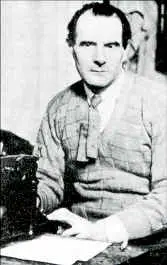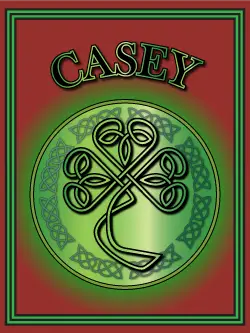Casey is one of the most popular surnames in Ireland. It is common throughout the country but especially in Munster counties such as Cork, Limerick and Clare. The name is derived from the old Gaelic names O’Cathasaigh and MacCathasaigh.
The name Cathasaigh meant vigilant and watchful. The prefix ‘O’ meant ‘descendent of’ while ‘Mac’ meant ‘Son of’. So the O’Cathasaighs were descendants of Cathasaigh. It could also be that the surnames were taken from tribe leaders and revered elders who may not have actually been direct ancestors.
Many septs across Ireland
There were at least six different septs or groups in Ireland that used the name. The biggest was in what is now counties Cork and Dublin. However, the most powerful were in the Northern Irish areas of Devenish Island and County Fermanagh.
The northern septs owned land and church properties for several generations.
The surname MacCathasaigh was also in popular in County Monaghan. In the 14th century, there were three bishops with the surname MacCathasaigh who occupied the see of Clogher. Clogher was one of 24 dioceses in South West Ulster.
In Dublin, the O’Caseys were Lords of the Suaithni, which was comprised of what would become the barony of Balrothery West.
In Co Roscommon, an O’Casey sept were Erenaghs of Clondara in the barony of Athlone. The Erenagh was an official position which involved administering parish revenue from tithes and rents.
Famous Caseys around the world

John Keegan Casey was known as the ‘Poet of the Fenians’. He was a Republican and a poet, novelist and orator. When he was just 15 he wrote the song ‘The Rising of the Moon’ which commemorates the 1798 Irish Rebellion.
Casey later became a key figure in the 1867 Fenian Rising. Although he was just 20 years old at the time, he had become a respected leader thanks to a book of pro-Irish poetry that he published, and for speeches he made at rallies in Dublin, London and Liverpool.
The Fenian Rising was unsuccessful and Casey was captured by the British. He was imprisoned for eight months. He was freed on the understanding that he would leave Ireland for Australia.
However, Casey stayed in Ireland and continued to write poetry. He lived the rest of his life in disguise.
His health never recovered from the time he spent in prison and he died two years after his release. There were up to 100,000 mourners who paid their respects at his funeral procession.
Sporting Caseys

James Casey is a professional American Football player. He has played for the Houston Texans and the Philadelphia Eagles in the NFL. Before becoming a professional football player, Casey spent three years playing professional baseball with the Chicago White Sox.
Conor Casey is a professional soccer player who has represented the United States national team in the 2009 Confederations Cup. He also helped The USA reach the World Cup in 2010. He won the MLS Cup in 2010 and was named Most Valuable Player in the tournament.
Creative Caseys
Sean O’Casey was one of Ireland’s most celebrated playwrights and the first to write extensively about working class themes and people. His best known works are June and the Paycock, the Shadow of the Gunman, and the Plough and the Stars.
Ken Casey is the singer, bass guitarist and primary songwriter of Boston Celtic band, the Dropkick Murphys. The Dropkick Murphys have had a long and successful career and delighted crowds across the world with their Celtic punk anthems. Click here for more about the Dropkick Murphys
John Casey is an American novelist. In 1989, his book Spartina won the US National Book Award for Fiction.
